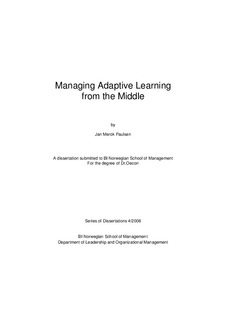| dc.description.abstract | The main purpose of this study is to contribute to the understanding of how school organizations adapt their core technology to demands imposed from their external environments. Built on open system theories, schools are seen as interdependent with their environments and school professionals are also part of those environments. School boundaries, although they are seemingly clearly defined, are thereby seen as permeable membranes that allow for osmosis of knowledge, information and resources across them. The chosen theoretical perspective views schools as interactive learning systems that may be capable of adjusting their practices to changes in the environments through learning from experience. The term adaptive learning is therefore used to coin this outward looking process. Although there has been an intensifying interest in the problem of educational change during the last decades, adaptive learning theory has received only modest attention in the school management literature. The thesis, thus, aims to provide a contribution to fill this gap.
The findings show that vocational training institutions operate in fragmented external environments. Fragmentation means that school professionals depend on, and have to relate to, several different domains in their environments: Local working life, the state directorate, regional governance and stakeholders of the teacher profession. A stream of different demands, often incompatible, is imposed on schooling from the surrounding environments, and many of these demands exert direct technical influence on school conditions. Due to the distributed curriculum structure of vocational training, paired with internal loose couplings, each subunit operates as an open subsystem directed towards an identifiable domain in the environments on which they heavily depend. This has implications for the response mechanisms of the organization.
The identified adaptive learning process shows that schoolteachers and their middle managers institutionalize a multifaceted and local routine grounded on learning in collaboration with working life stakeholders. The process is problem based and driven by various forms of dissonance. Adaptation is composed of three forms of integrative learning, and these operations are promoted by knowledge brokering devices performed by middle managers. The findings thereby confirm that middle managers are uniquely positioned agents for promoting local adaptation. The middle management contribution to adaptive learning is multifaceted, and four identified categories are conceptually ordered under the umbrella concept of the knowledge broker. The findings have also identified a broader social environment conducive to improve the match between school practices and working life demands. This environment, defined as a distributed community of practice, has key implications for the adaptive learning process. Here, middle managers, schoolteachers and external stakeholders form common conceptions and norms, and devise strategies for coping with the schools’ multiple challenges. | en |
